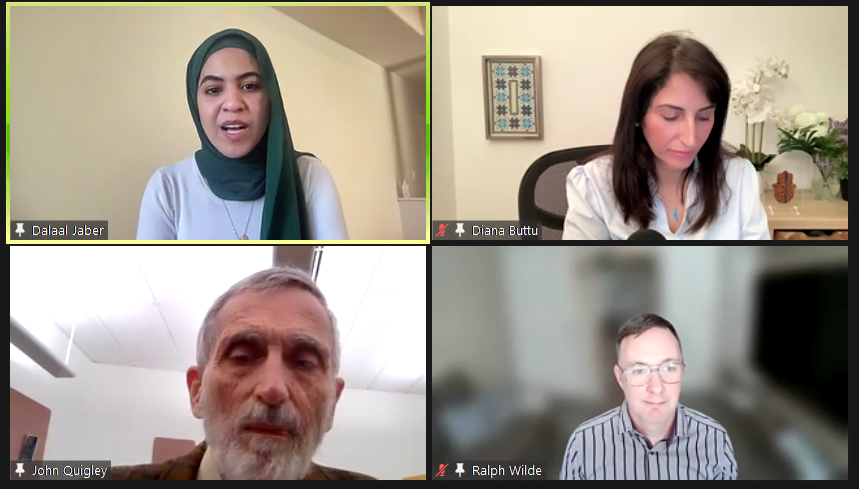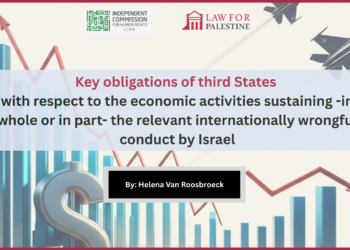Law for Palestine Gathers Legal Experts for Panel Discussion on ICJ Hearings in Historic Genocide Case (South Africa v. Israel)
In a groundbreaking development, South Africa has brought Israel to court for the first time in history, launching a legal battle at the International Court of Justice (ICJ) over allegations of genocide in Gaza. The ICJ conducted two hearing sessions for the South African and Israeli teams to decide on urgent provisional measures preventing the escalation of the alleged genocide in Gaza. This historic event sparked a live panel discussion hosted by the Law for Palestine organization on Friday, January 12, 2024, titled “Deciphering the ICJ Hearing on South Africa vs. Israel: Arguments and Prospects.”
The panel, which was livestreamed on YouTube and watched by 13,000 persons, aimed to decode the far-reaching implications of this historic moment, delving into the key arguments presented during the ICJ hearings and exploring the potential prospects of the provisional measures’ application and the broader case.
The panel was moderated by Dalaal Jaber, a Law for Palestine Fellow and International Lawyer, who set the stage by highlighting the significance of South Africa’s legal action. She recalled South Africa’s Justice Minister, Ronald Lamoua, intervention invoking Nelson Mandela’s words, emphasizing unity and solidarity with the people of Palestine.
The panel hosted three distinguished speakers: John B. Quigley (Legal Scholar, Professor Emeritus at The Ohio State University); Diana Buttu (Palestinian-Canadian Lawyer, Analyst at the IMEU); and Ralph Wilde (International Law expert – University College London). Each speaker brought a perspective to the discussion, shedding light on the legal details related to the allegations of genocide and the potential impact on the situation in Gaza.
John Quigley Analyzed ICJ’s Hearing on Gaza Genocide Allegations
During his intervention, Professor John B. Quigley provided key insights on the ICJ hearings regarding South Africa’s accusations of genocide by Israel in Gaza. Quigley criticized Israel’s argument on the “suspension” of military operations, stating it overlooked the unique circumstances in Gaza. He emphasized the necessity, as argued by South Africa, of “halting” military actions to end the ongoing genocide due to the vulnerable population’s inability to seek aid amidst continuous bombings.
Addressing the issue of intent, Quigley argued that the circumstances surrounding Israel’s evacuation order on October 13 strongly indicated intent to commit genocide, despite attempts to explain away statements by Israeli leaders.
Quigley expressed skepticism, when it comes to the ICJ’s jurisprudence, about the Court breaking from established norms, believing it unlikely to impose a higher standard than those witnessed in previous cases of Genocide.
On the risk of irreparable prejudice, Quigley highlighted the Court’s probable focus on Israel’s actions rather than speculating about Hamas, suggesting the Court would likely mandate the suspension of Israeli operations without delving into potential actions by Hamas.
Finally, concerning the timeline for a provisional measure application, Quigley noted the traditional two to three-week timeframe. He emphasized the Court’s likely urgency in issuing an order before the departure of four judges on February 6 – before there’s a change in the personnel of the Court.
Diana Buttu Acknowledged the Power and Strategy in South Africa’s Framing of the Case
In her intervention, Diana Buttu illuminated the complexities of the ICJ hearings, emphasizing the global significance of the case and its potential implications for justice and accountability.
Diana Buttu began by expressing the profound impact of watching South Africa’s hearing, noting the representative’s swift mention of the Nakba and the harsh realities faced by Palestinians over the past 75 years, while connecting these experiences to the 56 years of military occupation and eventually to the 17-year blockade on the Gaza Strip.
Addressing the strategic decision to frame the case as genocide, Buttu acknowledged its cleverness for several reasons. Firstly, she emphasized that the urgency of the request for provisional measures becomes more pronounced when categorized as genocide. Secondly, she pointed out that the prevention of genocide is a collective responsibility of all states, making it difficult for Israel to evade the issue.
Buttu showed optimism about the potential repercussions Israel might face on the international stage. She discussed the likelihood of Israel attempting to evade a ruling, potentially leading to Security Council involvement. Despite potential challenges, she emphasized the tragic human cost paid and the potential boost to the BDS movement as a response to Israel’s non-compliance with ICJ decisions.
When it comes to the broader implications for international law, Buttu underscored the importance of protecting the most vulnerable in society. She framed the case not just as an effort to stop Israel but as an opportunity to scrutinize and reform the international legal and political systems.
Addressing Israel’s defense invoking complementarity, Buttu criticized the selective nature of Israel’s legal actions. She pointed out the lack of accountability for genocidal statements and the impunity with which Israeli soldiers operate.
Ralph Wilde Dissects Complications and Ambiguities in Israel’s Defence
Ralph Wilde, in his discussion, explored the legal aspects of the South African case against Israel. Moving beyond the case’s narrow scope on Gaza and genocide, he underscored the significance of taking a broader perspective, addressing the fundamental questions that lie at the roots of the cause. He scrutinized Israel’s response, particularly its avoidance of addressing Gaza’s occupation and the deliberate vagueness surrounding self-defense.
In discussing Israel’s right to use force in self-defense against Gaza, Wilde pointed out a common oversight. Many people tend to separate the initial use of force from the subsequent military occupation it enables. He highlighted that the analysis of legality often focuses solely on the initial capturing of territory, without acknowledging that the occupation is a continuation of that use of force. According to Wilde, if the 1967 occupation was not lawful from the beginning or became unlawful once the threat was neutralized, Israel cannot claim the right to defend itself against a threat emerging from territory where it is already using force illegally.
Commenting on Israel’s defense strategy, Wilde noted the broad and vague references to self-defense, keeping options open and avoiding being pinned down. He pointed out the necessity for Israel to explain fundamental aspects that it had deliberately kept vague if the case proceeds to a full hearing.
The legal expert raised concerns about Israel’s assertion of “disputed territories”. He touched upon the significance of the Balfour Declaration and the Palestine Mandate, challenging arguments favoring Israel’s legality based on these historical documents.
Wilde critically analyzed Israel’s refusal to categorize the conflict and Gaza’s status, questioning the absence of mention of Gaza’s occupation and the deliberate avoidance of legal terms. He argued that the ongoing occupation since 1967 raises questions about the legality of Israel’s use of force in Gaza.
Finally, Wilde emphasized the inherent constraints of international law, noting that the legal framework revolves around Israel’s statehood. He highlights the dilemma of framing Palestinian self-determination within the context of statehood limitations. While the legal proceedings at the ICJ are based on Israel’s status as a state, Wilde acknowledges the complexities associated with challenging Israel’s actions within the existing legal structure.
* For a full summary of South Africa’s case before the court, click here
* For a full recording of the panel discussion, click here





